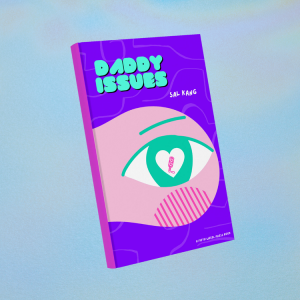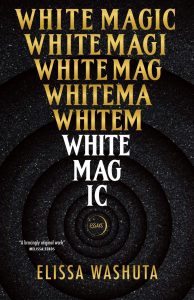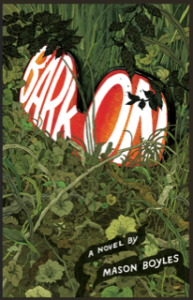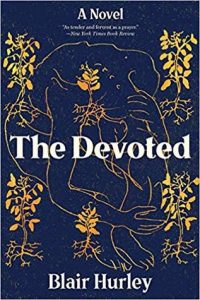Poetry. 32 pgs. fifth wheel press. June 2022.
 “1.0: my childhood was a lesson in discovering the body as a hazard”
“1.0: my childhood was a lesson in discovering the body as a hazard”
This line opens up “poem for protection,” a multipage narrative skirting the border between girlhood epic and the poetic potentiality of the femme occult, a border I did not know existed until entering Sal Kang’s DADDY ISSUES. Visceral descriptors of bodily proportions define the poem’s narrative of literal spellbinding proportions, turning the poem from a story encompassing relationality, shame, and sexual discovery into a protective tale, an enchantment edging towards the reclamation of the speaker’s girl body, girl story, and girl self. Even the numbers appearing before lines and stanzas feel like the steps towards a poetic hex upon the perversion of sex’s sanctuary by forced purity, systemic anti-queerness, and the simultaneous worship and degradation of girlhood.
Sal Kang’s DADDY ISSUES demands to be read with one’s entire body. The threats towards girlhood remain destructive even in the midst of poetic recollection, and Kang’s speaker forces the speaker to consider: What does it mean to be safe? To be protected? To be whole? And what does it mean to remember “The Girl” when “The Girl” is a victimized, subjugated past of a victimed present looking to reclaim and rediscover wholeness? In DADDY ISSUES, Sal Kang explores the possibilities within the answers to these questions through the recollection of religiosity, relationality, and sexuality in a uniquely-queer poetics of formal experimentation and hypnotic physicality. Ultimately, though I refer to the speaker as “The Girl” for their archetypal role, the speaker reveals that this identity, being “The Girl,” is simply that: a role that is played, a role that can be “unplayed” when autonomy and selfhood are gained, and a role laid to rest in the past when the true self is taught and re-taught to live.
DADDY ISSUES’ speaker encompasses a number of spaces meant for “The Girl” throughout the collection. In “pink, like your brain: an index,” they are a catalogue of visceral memories and moments; in “poem for a blue page,” they spiral into a self-negotiation about taking up space; and in “in praise of nonviolent tuesdays,” they appear in winding dialogue about their asterisked, greyed-out path exploring love and its many side effects. All of these poetic iterations of girlhood glom together like a fucked-up confection, like a “fractioned / distorted / flowerless / gawk” that consumers wish to see and eat in “selling nudes to strangers online.” The effect is striking: Kang effectively coagulates their speaker into The Girl as both consumable and all-consuming, a forcefully-halfed and subjugated being attempting to reclaim selfhood through the exploration of their traumatic past and ever-reclaiming present.
Perhaps the most intriguing and successful iteration of the speaker is one that can only be described as an amorphous, femme Christ. Christ is mentioned earlier in DADDY ISSUES in the poem “the finger that aches,” wherein the speaker remarks, “i wonder why they didn’t nail Jesus’s fingers/that’d hurt more.” The speaker’s knowledge of pain is experiential; rather than simply recollecting that experience, though, The Girl takes up this space of sacrificial non-autonomy and, thus, takes on the role of protector of the present speaker’s past girlhood. Performing this religious roleplay allows for the speaker to express their desires for consensual sexual consumption. For instance, in “potassium to water, or questions I ask my lover before we go to bed,” the speaker literally asks their lover to be “swallowed whole” and compares the experience with peeling a tangerine. Kang’s The Girl speaker’s sacrificial mode affords them autonomy and healing when the “private gospel” of BDSM coupling and aftercare concludes DADDY ISSUES in the final poem, “epilogue.”
Effectively mirroring the forced positionality of girlhood, Sal Kang utilizes formal experimentation to further enhance the traumatic experiences of The Girl and ensure the speaker’s ultimate “ungirling” by the end of the collection. Unlike the expectation of shrinkage placed on girlhood, Kang’s speaker and their lines takes up massive amounts of the page, weave throughout the expected margins, and even spiral into a hypnotic abyss. Such spatial variations force Kang’s readers to recognize the contortions forced upon girlhood to accommodate, feminize, and forcefully desexualize their existence.
Once Kang’s readers reach “epilogue,” the speaker’s prior poetic contortions of self-loathing and childhood memories of shame disappear in favor of sweet intimacy. Yes, pain still exists, but this pain is one of understanding, of empathy, of a thoughtful process of pain and instruction and aftercare. Before, like in “poem for protection,” the speaker’s lungs are “guilt-soaked.” Now, the speaker uses their body to proclaim their selfhood in consensual pain: “i exist i exist i exist / you hurt me & the hurt undoes itself.” Furthermore, Kang expands the nature of this intimacy with the interplay between the “i” and the “you” in the collection’s final line: “when i forget how to breathe, you reteach it to me.” Throughout DADDY ISSUES, Kang’s speaker regularly attempting to teach themselves how to be The Girl, to be the perfect exemplar of girlhood. In the last moments of the collection, though, the “you” functions as both an erotic, romantic partner and as the speaker’s self—that is, the one they learned to be from the experiences of their time forced to be in girlhood. Wholeness, then, is a process, not an end, with the speaker’s partner and own self constantly reteaching themselves how to be the person they truly are, the person who breathes without those guilt-soaked lungs and without the forced identity of girlhood.
Though inertia is acceptable, as the speaker assures in “affirmations for the masochist,” DADDY ISSUES never ceases to be relentless in its poetic memory and explication of a past girlhood. In short, DADDY ISSUES disarms. Kang uses their poetics to curate a complex speaker defined by their journey through girlhood towards anti-girlhood, disarming the reader’s expectations of the aftermath of a life fueled by systemic paternalism and abuse. Ultimately, Sal Kang’s DADDY ISSUES questions the mainstream inclinations towards wholeness in forced girlhood and argues for sexual sanctuary in queerness and self-made love, a connection wherein pain is a reclamation of one’s own power to feel it.
Daddy Issues is available through fifth wheel press. Purchase it now through their website.
JILLIAN A. FANTIN (@jilly_stardust on Twitter) is a poet currently based in Texas. They are the co-founder and editor-in-chief of RENESME LITERARY (@RenesmeLiterary), recipient of a 2021 Poet Fellowship from the Martha’s Vineyard Institute of Creative Writing, and a regular collaborator with mixed media artist Kate Luther. Jillian’s work is published in or forthcoming from The American Journal of Poetry, TIMBER, The Daily Drunk, Harpur Palate, Selcouth Station, Homology Lit, and elsewhere
Like what you’re reading?
Get new stories or poetry sent to your inbox. Drop your email below to start >>>
OR grab a print issue
Stories, poems and essays in a beautifully designed magazine you can hold in your hands.
GO TO ISSUESNEW book release
Ghosts Caught on Film by Barrett Bowlin. Order the book of which Dan Chaon calls “a thrilling first collection that marks a beginning for a major talent.”
GET THE BOOK


